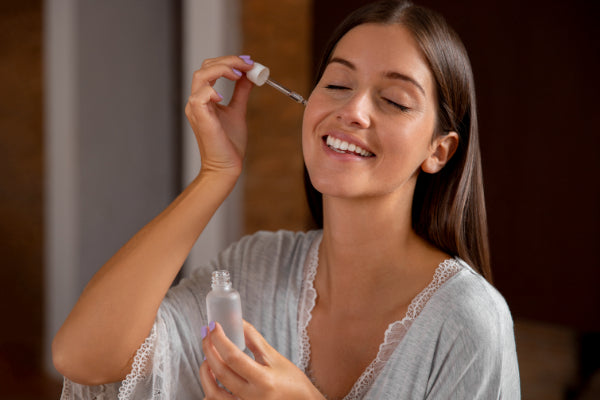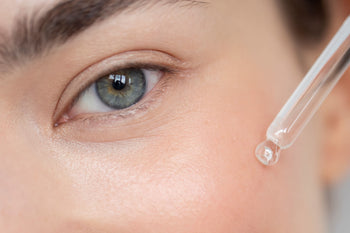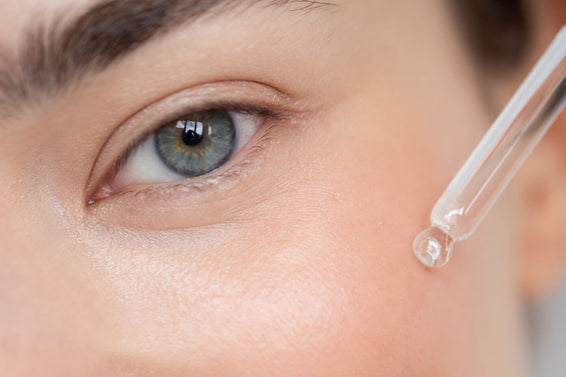For skincare enthusiasts, retinol is probably something they use often, have considered or at least wonder about at some point. Retinol is one of the widely-known skincare ingredients on the market available as a liquid serum, gel, cream, and moisturizer.
This blog will explain the benefits of retinol, how to safely use it for your skincare routine, and any potential side effects that you need to know.

What is Retinol?
Retinol is a form of Vitamin A commonly used in skin care to support graceful aging. Some people refer to it as Vitamin A1. It is a group of fat-soluble vitamins commonly found in carrots, eggs and sweet potatoes.
When retinol is applied topically, it converts to retinoic acid with the help of enzymes found in the skin. Retinol has beneficial effects on acne, wrinkles, blemishes, and skin tone.
How Retinol Serum Works
Retinol is considered as a “gold-standard” ingredient in skin care. It is a powerful emollient that alters the behavior of aged cells so they act in a more jubilant manner. It encourages normal skin activity to regenerate new cells for more youthful-looking skin.
Regular use of retinol serum is a proven age-preventive skincare routine, which helps accelerate cell renewal, enhance collagen production and fade signs of skin aging such as uneven texture, age spots and wrinkles.
Benefits of Retinol Serum
Applying Vitamin A on your skin in the form of retinol serum for a continuous period of time has many benefits for healthy skin.
Minimizes Fine Lines and Wrinkles
Skin aging can occur due to biological age as well as external factors, such as sun exposure, smoking and pollution. This can result to loss of skin elasticity leading to visible signs of aging including fine lines, wrinkles and sagging skin.
Retinol helps minimize the breakdown of collagen as it stimulates cell turnover and collagen production in the skin. Collagen functions as a building block of skin that keeps the skin firm and smooth. This can result to plumper, more youthful-looking skin.
Brightens Dull Skin
Retinol brightens dull-looking skin by exfoliating at a cellular level. It evens out the skin tone as it brings out your radiant skin glow. Continuous use results to brighter and smoother new skin.

Reduces Acne Breakouts
Acne is a common skin condition caused by dead skin cells, dirt and excess oil that clog the hair follicles of the skin. Bacteria can also invade these blocked pores and result to inflammation causing blackheads, whiteheads and pimples.
Topical use of retinol or products with retinol can reduce these breakouts and help with acne treatment. Retinol helps speed up turnover of skin to keep the pores unclogged. It exfoliates the outermost layer of the skin to remove dirt, dead skin cells, and oil from pores. As a result, formation of pimples and acne breakouts are prevented.
Regulates Oily Skin
Retinol is a hero product for oily skin types. The solution for oily skin is a product that exfoliate, increase cellular turnover and unclog pores. Retinol serum does all these that’s why it is the perfect product to use for oily skin.
Protection of the Skin
Because of its regenerating properties, retinol is also believed to strengthen and thicken the outer layer of the skin called the epidermis. This may help protect the skin against external stressors such as pollution. It also helps reduce the amount of water that passively evaporates from the skin, resulting to plumper skin.
Spotless Complexion Over Time
Skin aged by sun damage may show darker spots, otherwise known as age spots. Retinol helps reduce existing and prevents further development of age spots as well as hyperpigmentation. This form of spot treatment is safe for all skin types.

Can You Use Retinol and Vitamin C Together?
With new must-try skincare launches and sales happening frequently these days, it can be tempting to purchase anything and smear it on your face, with little thought about whether the products you’ve picked will actually work well together. If not considered properly, it could actually be detrimental when incorporated incorrectly into your beauty routine.
This is often the case with Retinol and Vitamin C, two ingredients that essentially tackle the same skin issues—dark spots, wrinkles, and uneven tone. It only seems right that you should use these two powerful ingredients in tandem, with the idea that they will sum up with better results. But that is not always the case.
Retinol and Vitamin C increase skin irritation and sensitivity if used on top of one another. It can also weaken their effectiveness if layered together. It is generally discouraged to layer these two products but they work very well with alternating use.
How to Add Retinol to Your Skincare Routine Alongside Vitamin C
The best way to add both Retinol and Vitamin C to your skincare routine and reap the benefits from both ingredients is by alternating them between your morning and evening routines. You can choose a Vitamin C Serum for morning application and be sure to apply SPF on top of it. This helps your skin stay protected from damage while correcting age spots and uneven tone.
Then before bedtime, smear a rich amount of Retinol Serum on your skin. Some types of retinols are degraded by sunlight, so it is best to use them at night.
Possible Side Effects and Precautions
Retinol is a very powerful ingredient and can cause irritation or sensitivity when used too often or incorporated into a skin care routine too quickly. People who use retinols commonly experience dryness, itchiness, redness and peeling of the skin, especially if new to using the product.
These side effects are temporary and will likely improve within a few weeks as your skin gets used to the product. But if such side effects persist, you may find an alternative with reduced strength or change the way you use the product. Below are some useful tips.

Retinol Usage Tips
- Begin slowly – Slowly add retinol into your nightly routine once or twice a week for the first week and increase it gradually from there, depending on how your skin reacts to it. If there is visible redness or peeling, reduce the frequency to one time per week and monitor your skin before increasing use.
- Every other day – Another possible solution is to decrease the frequency of application to every other day and slowly build up your skin’s tolerance to retinol before moving to daily use.
- Apply after washing – Apply retinol 30 minutes after washing your face to help reduce the potential of skin irritation.
- Allow it to absorb – allow the retinol serum to absorb in the skin for 20 to 30 minutes before applying another product on top.
- Don’t use multiple retinol products – The risk of side effects may also be greater if you use more than one product that contain retinol at the same time.
Who Should Skip Retinol?
- People who spend a lot of time in direct sunlight – Avoid retinol if you’re going to be spending a lot of time in direct sunlight. Retinol can make your skin more sensitive to the sun, so it’s important use proper sun protection too.
- Pregnant women – Retinol is not recommended for pregnant women. It may increase the risk of birth defects and miscarriage. It is advised to talk to your doctor about this first.
- People with eczema – Using retinols may aggravate eczema. Avoid using for skincare if you have an active eczema rash.

Dosage
To use retinol serum, take 2-3 drops of the serum and apply it on your face. Spread to your neck and upper chest area for even results. You may add more drops if needed. Remember to allow the serum to absorb before applying other products on top of it.
It is important to use the product regularly. Start small (like twice a week) and work your way up until your skin is able to tolerate daily use. If the skin reaction such as redness or irritation occur, lessen the concentration or frequency of use.
When Can You Expect Results?
Remember that in order to start seeing the benefits of retinol, you need to use it continuously for a long period of time. Nothing is overnight especially when it comes to skincare. Most fast-acting skincare products are damaging to the skin and may contain unknown ingredients that actually cause the fast results. But these results often don’t last as the skin gets damaged eventually.
With retinol, consistency is key. You’ll notice the improvement gradually happening as your skin naturally looks healthier and more youthful. It can take up to 2 to 3 months to see best results.















